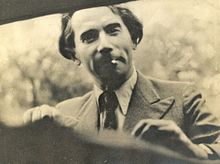Benjamin M. Bloch
| Benjamin Marcus Bloch | |
|---|---|
 |
|
| Born |
April 1, 1900 Delatyn, Austria-Hungary |
| Died | April 26, 1959 (aged 59) New York City, United States of America |
| Nationality | Israeli |
| Citizenship | Israeli |
| Alma mater | Charles University in Prague |
| Scientific career | |
| Fields | Physics |
| Institutions |
Charles University in Prague Université libre de Bruxelles University of Cambridge Weizmann Institute of Science |
| Doctoral advisor | Jacques Errera |
Benjamin Marcus Bloch (Hebrew: בנימין מרכוס בלוך, (April 1, 1900 – April 26, 1959) was an Israeli physicist, known mainly for his work at the Weizmann Institute of Science.
Bloch was born in Delatyn, Galicia, then Austro-Hungarian monarchy, on April 1, 1900, to a family of Hassidic Jewish scholars and rabbis, descendants of the Ba'al Shem Tov. In 1914, at the beginning of World War I, his family moved to Prague.
Bloch studied physics at the Prague's German Charles-Ferdinand University, where he received in 1924 his degree of Doctor of Natural Sciences (Dr. rer. nat.) with honors. Bloch stayed at the university as a research assistant to Professor Biedle, devoting his work to research on canal rays, dipole moments, infra-red and microphotography.
In 1920, at age 20, his father died and Bloch, who wanted to earn his living by himself, started to work as a journalist in the German-language newspaper Prager Tagblatt. There, while studying and working on his scientific research, Bloch became a senior journalist and held the position for ten years, until 1930.
In 1929, Bloch was invited by Professor Jacques Errera to work with him at Brussels' Université Libre as a senior researcher at the chemical physics department. Bloch worked there in the area of infra-red spectroscopy.
...
Wikipedia
